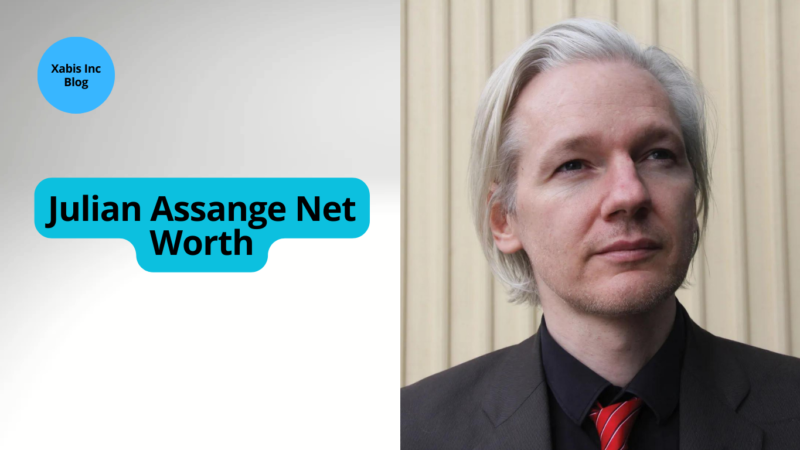As of 2024, Julian Assange, an Australian publisher, journalist, computer programmer, and internet activist, has a net worth of $300 thousand. Born on July 3, 1971, Assange is 52 years old. He is best known for his role as the editor-in-chief of WikiLeaks, a whistleblower website that has released a vast array of classified and sensitive information, significantly impacting global politics and journalism.
What Are Julian Assange’s Early Life and Background?
Julian Paul Hawkins, better known as Julian Assange, was born in Townsville, Queensland, Australia. His parents, Christie Ann Hawkins and John Shipton, separated before his birth. Julian later adopted the surname of his stepfather, actor Brett Assange, whom his mother married when Julian was a year old. Julian’s interest in technology and programming emerged early in his life. By the age of 16, he was already hacking under the pseudonym “Mendax” and formed a hacking group called “The International Subversives.”
How Did Assange Begin His Career in Hacking?
In the late 1980s, Assange’s hacking activities brought him significant attention. In 1991, he was caught hacking into the Melbourne master terminal of Nortel, a major Canadian telecommunications company. This led to his home being raided by the Australian Federal Police, and he was subsequently charged with multiple counts of hacking and related crimes. Assange pled guilty to most charges and was released on a good behavior bond.
How Did WikiLeaks Come Into Existence?
Julian Assange founded WikiLeaks in 2006, aiming to create a platform for anonymous whistleblowers to submit classified and sensitive information. Initially conceptualized as an “open-source, democratic intelligence agency,” WikiLeaks quickly abandoned its open-editing aspect but continued to publish submissions from anonymous sources. The platform gained international prominence by exposing extrajudicial killings in Kenya, toxic waste dumping in Côte d’Ivoire, and the contents of Sarah Palin’s hacked email account, among other significant leaks.
What Were WikiLeaks’ Most Controversial Releases?
WikiLeaks shook the world in 2010 with a series of high-profile releases. These included the “Collateral Murder” video, which showed a 2007 airstrike in Baghdad that killed civilians, and the Afghan War Diary and Iraq War Logs, which provided extensive details about the conflicts in Afghanistan and Iraq. The climax of these revelations was “Cablegate,” the release of hundreds of thousands of U.S. diplomatic cables. These disclosures sparked global debates about national security, government transparency, and the ethics of whistleblowing, significantly straining international relations.
What Legal Challenges Has Assange Faced?
Assange’s work with WikiLeaks has brought him numerous legal challenges. In 2010, Sweden issued an arrest warrant for him on sexual assault allegations, which he denied. Fearing extradition to the U.S. from Sweden, Assange sought asylum in the Ecuadorian embassy in London in 2012, where he remained until his arrest by British authorities in 2019. During his time in the embassy, the U.S. pursued charges against him under the Espionage Act for publishing classified documents provided by former U.S. Army soldier Chelsea Manning.
What Happened After Assange’s Asylum Was Revoked?
In April 2019, Ecuador revoked Assange’s asylum, leading to his immediate arrest by British police. He was found guilty of breaching bail conditions and sentenced to nearly a year in prison. Subsequently, the U.S. government unsealed indictments against him, charging him with violating the Espionage Act. Assange was held in London’s Belmarsh Prison while U.S. authorities sought his extradition. In January 2021, a British judge ruled against his extradition to the U.S., citing concerns about his mental health and the risk of suicide.
How Did Assange’s Legal Battle Conclude?
Julian Assange’s prolonged legal battle saw a significant development in June 2024 when he reached a plea deal with U.S. prosecutors. Under this agreement, Assange pled guilty to a single charge under the Espionage Act, which allowed for his immediate release from British custody. This plea deal marked the end of a years-long saga that had seen Assange become a polarizing figure in global debates on freedom of the press, government transparency, and the ethics of whistleblowing.
What Is Assange’s Impact on Journalism and Whistleblowing?
Julian Assange’s work through WikiLeaks has had a profound impact on journalism and the practice of whistleblowing. His efforts have highlighted the importance of transparency and accountability in government and corporate activities. Assange has been both lauded and criticized for his role in exposing classified information. Supporters view him as a champion of free speech and a hero of investigative journalism, while critics argue that his actions have endangered lives and compromised national security.
What Are Assange’s Future Prospects?
With his legal battles behind him, Assange’s future remains uncertain. His health has reportedly suffered during his time in confinement, and his ability to continue his work with WikiLeaks or any other similar endeavors is unclear. Nevertheless, his legacy as a pivotal figure in the fight for transparency and freedom of information is firmly established. As debates over government secrecy and the role of whistleblowers continue, Julian Assange’s influence on these issues is likely to endure.







